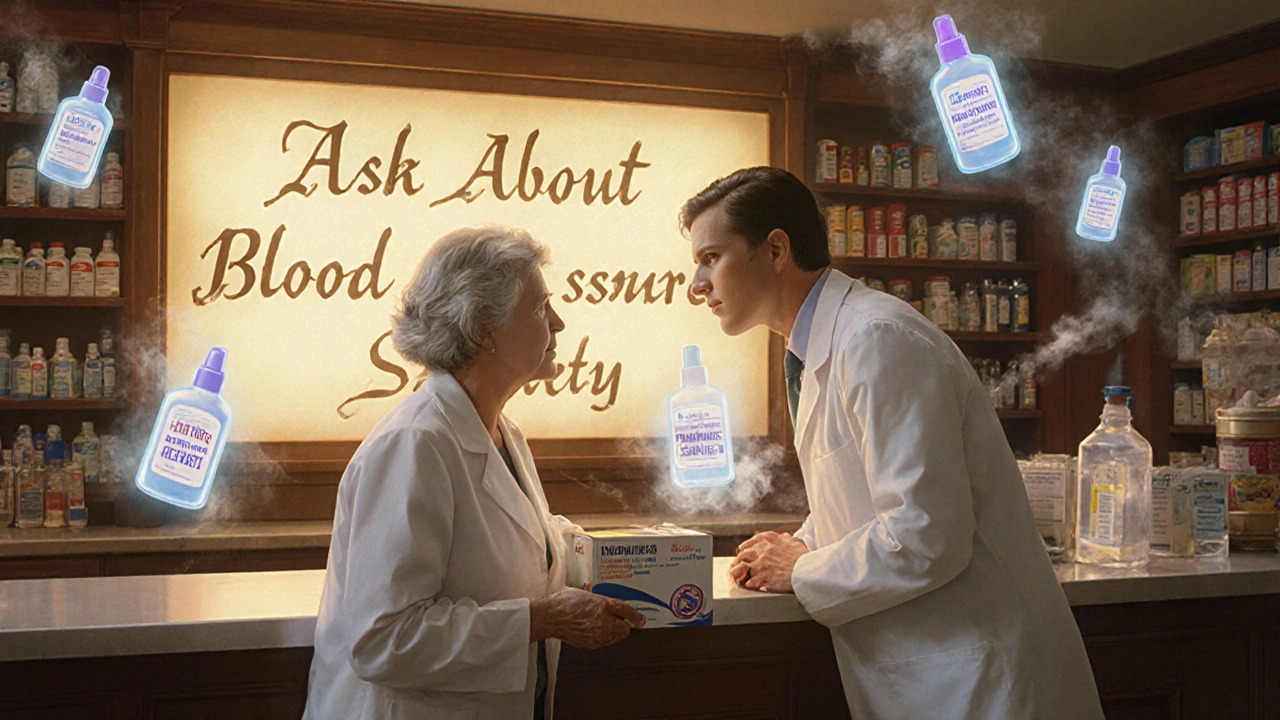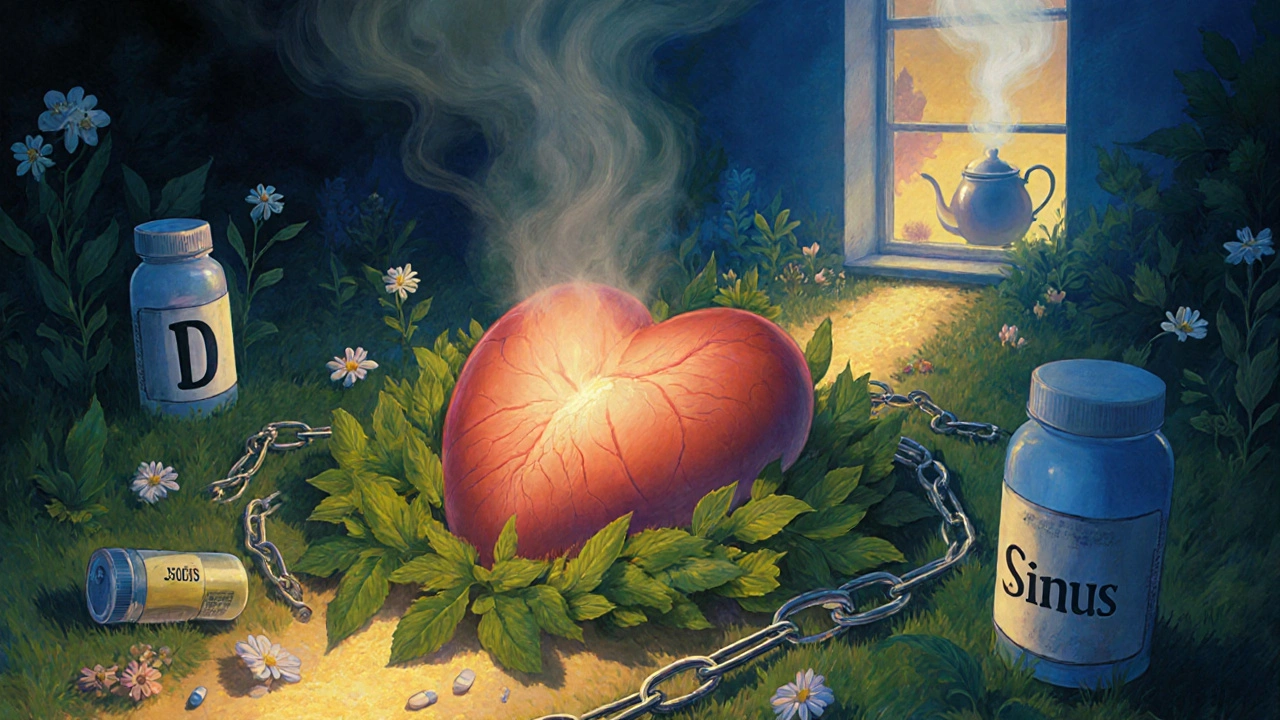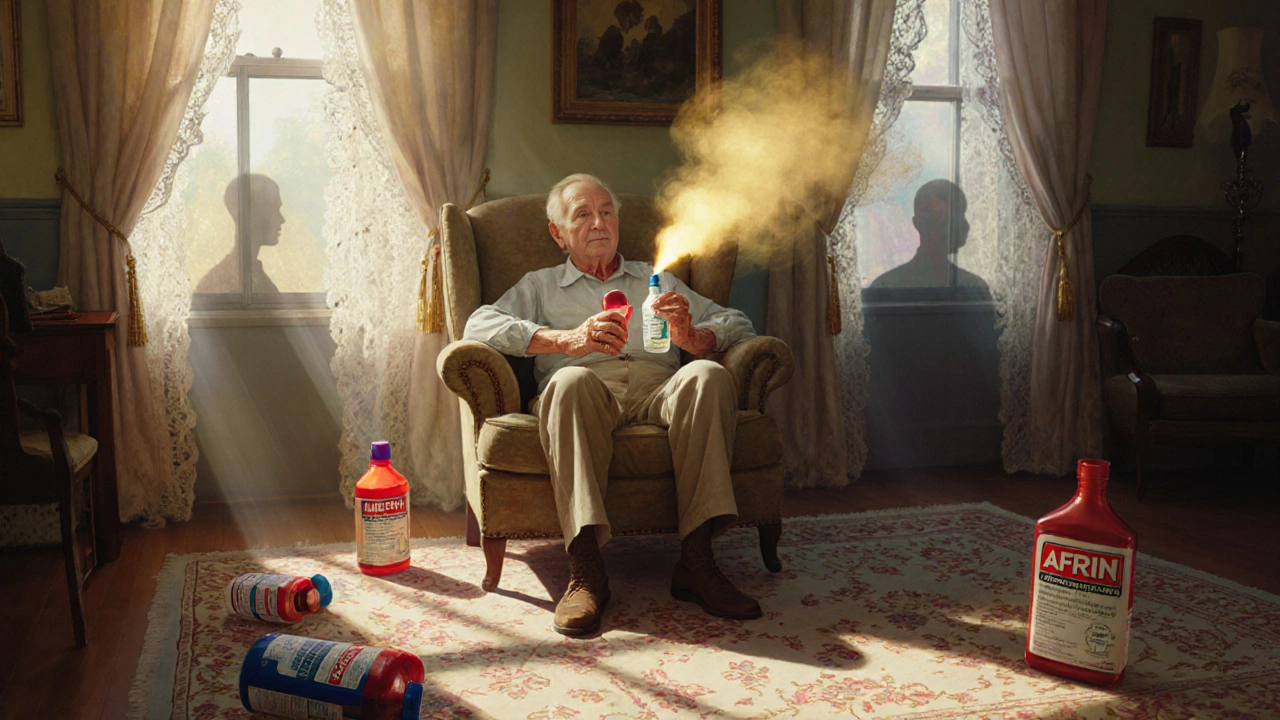Decongestant Safety Checker
Check Your Medication Safety
Select your blood pressure medication and the decongestant you're considering to see if they're safe together.
How This Works
This tool helps you understand if your blood pressure medication interacts with common decongestants. Based on the article, some combinations can cause dangerous blood pressure spikes or other serious side effects.
If you’re on blood pressure medication and your nose is stuffed up, you might be tempted to grab a bottle of Sudafed or a multi-symptom cold tablet. But doing so without checking first could raise your blood pressure to dangerous levels-sometimes in just hours. This isn’t a rare issue. Around 75 million adults in the U.S. have high blood pressure, and many don’t realize that common over-the-counter decongestants can undo the work of their prescription meds.
How Decongestants Affect Blood Pressure
Nasal decongestants like pseudoephedrine and phenylephrine work by tightening blood vessels in your nose to reduce swelling and clear congestion. That sounds helpful-until you realize those same blood vessels are everywhere, including in your heart and arteries. When these drugs constrict vessels systemically, your heart has to pump harder, your heart rate can spike, and your blood pressure climbs. Even if your hypertension is well-controlled, a single dose of pseudoephedrine can push your systolic pressure up by 5 to 10 mmHg. For someone already on the edge, that’s enough to trigger a headache, dizziness, or worse.It’s not just oral pills. Topical sprays like Afrin (oxymetazoline) are often thought to be safer because they’re applied locally. But studies show up to 30% of the active ingredient can still enter your bloodstream. That’s why even nasal sprays carry warnings for people with high blood pressure. The effect may be shorter-lived, but the risk is real.
Which Decongestants Are Most Dangerous?
Not all decongestants are created equal. Here are the main ones to avoid if you’re on blood pressure meds:- Pseudoephedrine - Found in Sudafed, Claritin-D, Zyrtec-D, and many cold formulas. This is the most potent and well-studied risk. It’s sold behind the pharmacy counter in the U.S. for a reason.
- Phenylephrine - Now the most common decongestant in store-brand cold meds, after pseudoephedrine was restricted. But research shows it’s just as risky for blood pressure, even if less effective at relieving congestion.
- Ephedrine - Rare in OTC products now, but still found in some weight-loss or energy supplements. Extremely dangerous with hypertension.
- Oxymetazoline - The active ingredient in Afrin and similar nasal sprays. Don’t assume topical means safe.
These ingredients don’t just raise blood pressure-they can also interfere with how your other meds work. For example:
- With beta-blockers like metoprolol, decongestants can cause your heart to race uncontrollably.
- With calcium channel blockers like nifedipine, they may blunt the drug’s ability to relax your arteries.
- With MAO inhibitors (used for depression or Parkinson’s), they can cause life-threatening spikes in blood pressure.
What Your Blood Pressure Meds Don’t Tell You
Many people think if their doctor prescribed them a daily pill, they’re in the clear to take anything else. That’s a dangerous assumption. The American Heart Association says clearly: “Patients with hypertension should use decongestants only under the direction of their health care provider.” But most OTC packages don’t spell out the full risk. They say “ask your doctor if you have high blood pressure”-but they don’t say why or how dangerous it really is.Even if your blood pressure is “controlled,” decongestants can still cause sudden spikes. A 2024 study found that 22% of emergency visits for uncontrolled hypertension in adults over 50 were linked to OTC decongestant use. Many of these patients had no idea their cold medicine was the culprit.

Safer Alternatives for Congestion Relief
You don’t have to suffer through a stuffy nose. There are effective, safe options that won’t raise your blood pressure:- Nasal saline spray - Plain saltwater sprays (like NeilMed or store brands) flush out mucus and irritants without any drug effect. Use several times a day.
- Steam inhalation - Take a hot shower or breathe in steam from a bowl of hot water (cover your head with a towel). Moisture loosens mucus naturally.
- Antihistamines - If your congestion is from allergies (not a virus), drugs like loratadine (Claritin) or cetirizine (Zyrtec) can help. They don’t constrict blood vessels. Avoid antihistamines with decongestants-check labels carefully.
- Humidifiers - Keeping the air moist at night reduces nasal dryness and congestion.
- Hydration and rest - Drinking water and sleeping with your head elevated can make a surprising difference.
These alternatives may take longer to work than a decongestant pill-but they’re safe for your heart. And for most mild colds, your body clears the infection in 7 to 10 days anyway.
How to Read Labels Like a Pro
The biggest danger isn’t the obvious decongestant-it’s the hidden one. Cold and flu products often combine 4 to 6 ingredients. You might think you’re just taking a cough suppressant, but the label says “active ingredients: dextromethorphan, guaifenesin, phenylephrine, chlorpheniramine.”Always check the Active Ingredients section-not the brand name or marketing claims. Look for these words:
- Pseudoephedrine
- Phenylephrine
- Oxymetazoline
- Ephedrine
- Phenylpropanolamine
Also watch out for “D” versions-Claritin-D, Zyrtec-D, Allegra-D. The “D” stands for decongestant. And don’t forget about sodium content. Some cold medicines contain high levels of salt, which can also raise blood pressure. Check the “Inactive Ingredients” for sodium bicarbonate or sodium citrate.
When You Absolutely Must Use a Decongestant
Sometimes, despite all alternatives, congestion is so bad it’s interfering with sleep, breathing, or recovery. If your doctor says it’s okay to use a decongestant, follow these rules:- Use the lowest dose available.
- Take it for the shortest time possible-no more than 3 days.
- Check your blood pressure before and after each dose. If it rises more than 10 mmHg systolic, stop immediately.
- Never combine with alcohol or other stimulants (like caffeine pills or energy drinks).
- Don’t use if you have heart disease, arrhythmia, or a history of stroke.
Even then, monitor closely. A 2023 study in the Journal of the American Pharmacists Association showed that when pharmacists actively counseled hypertension patients on decongestant risks, inappropriate use dropped by 47%.

Ask Your Pharmacist-Don’t Just Walk Away
In the U.S., pseudoephedrine is kept behind the counter. That’s not just to limit sales-it’s to create a safety check. When you ask for it, the pharmacist is required to ask if you have high blood pressure, heart disease, or thyroid issues. Use that moment. Say: “I’m on blood pressure medication. Is this safe for me?”Pharmacists are trained to spot dangerous interactions. They can recommend alternatives, check your full medication list, and even call your doctor if needed. Don’t skip this step. It’s one of the most effective ways to avoid a preventable health crisis.
Keep a Medication List
Write down every pill, spray, supplement, and herbal remedy you take-even the ones you only use occasionally. Include dosages and how often you take them. Bring this list to every doctor’s visit, and update it after every OTC purchase.Why? Because your primary care doctor or cardiologist may not know you took a cold tablet last week. But if you show them your list, they can spot the problem before it becomes an emergency.
What’s Changing in 2025 and Beyond
The medical community is waking up to this issue. The American College of Cardiology plans to update its hypertension guidelines in 2026 to include clearer warnings about OTC drug interactions. Several pharmaceutical companies are testing new decongestants that relieve congestion without constricting blood vessels-early trials look promising.But until those new drugs are available, the safest choice remains: avoid decongestants if you have high blood pressure. Your heart doesn’t need the extra strain. And your body can heal without them.
Can I use nasal saline spray if I have high blood pressure?
Yes, nasal saline spray is completely safe for people with high blood pressure. It works by physically flushing out mucus and irritants without affecting blood vessels or heart function. Use it as often as needed-no limits or risks.
Is phenylephrine safer than pseudoephedrine?
No, phenylephrine is not safer. Although it’s now more common because pseudoephedrine is restricted, research shows both raise blood pressure similarly. In fact, phenylephrine may be less effective at relieving congestion, making it a worse choice overall for people with hypertension.
Can I take Afrin (oxymetazoline) if I’m on blood pressure meds?
It’s not recommended. Even though it’s a nasal spray, a portion of the drug enters your bloodstream and can raise blood pressure. The manufacturer’s label warns against use in people with hypertension. Safer alternatives like saline spray are just as effective without the risk.
How long does it take for decongestants to raise blood pressure?
Effects can start within 30 to 60 minutes after taking an oral decongestant. Peak levels happen in 1 to 3 hours. Even a single dose can cause a noticeable spike, especially in people with uncontrolled hypertension. Monitor your blood pressure if you’ve taken one, even if you feel fine.
What should I do if I accidentally took a decongestant?
Stop taking the product immediately. Check your blood pressure. If it’s more than 20 mmHg higher than your normal baseline, or if you feel chest pain, dizziness, or a rapid heartbeat, seek medical help right away. If your blood pressure is only slightly elevated and you feel okay, call your doctor or pharmacist to discuss next steps. Don’t wait for symptoms to worsen.
Are there any cold medicines that are safe for people with high blood pressure?
Yes-but you have to read labels carefully. Look for products labeled “for high blood pressure” or “decongestant-free.” Plain antihistamines like loratadine (Claritin), pain relievers like acetaminophen (Tylenol), and saline sprays are safe. Avoid anything with “D,” “Sinus,” “Congestion,” or the active ingredients pseudoephedrine, phenylephrine, or oxymetazoline.







Comments
andrea navio quiros
31 October 2025Decongestants are just one more way the system profits off our ignorance
Pharma doesn’t want you to know saline works better
They want you dependent on pills that raise your BP
It’s not about health-it’s about revenue streams
And we keep buying it because it’s easy
But easy isn’t safe
Simple isn’t sexy
And that’s the tragedy
Andy Ruff
2 November 2025People still don’t get it. You think your ‘natural remedies’ are going to save you? You’re just delaying the inevitable. Pseudoephedrine isn’t evil-it’s a tool. The problem is people who don’t monitor their vitals. If you’re on blood pressure meds and you’re not checking your numbers daily, you’re not managing your health-you’re gambling with your life. And now you’re blaming the decongestant? That’s not responsibility, that’s cowardice. Wake up. Your body is not a toy. Stop treating medicine like a grocery list.
Matthew Kwiecinski
4 November 2025Phenylephrine is not equivalent to pseudoephedrine in efficacy, but the BP risk profile is statistically indistinguishable in meta-analyses. The FDA’s decision to replace pseudoephedrine with phenylephrine in OTC products was based on abuse potential, not safety. This is a classic case of regulatory substitution without clinical justification. The result? Consumers believe they’re safer, while the pharmacological risk remains unchanged. The label says ‘ask your doctor’-but the industry doesn’t want you to ask. They want you to buy.
Manuel Gonzalez
4 November 2025Really appreciate this breakdown. I’ve had high BP for years and never realized how sneaky those ‘D’ versions are. I used to grab Zyrtec-D like it was just an allergy pill. Turns out I was accidentally sabotaging my meds. Started using saline spray and a humidifier instead-no more headaches, no spikes. Also, the pharmacist tip? Game changer. Last time I asked, they pulled up my med list and flagged three other OTC things I didn’t even think about. Honestly? More people need to talk to pharmacists. They’re the real MVPs.
Brittney Lopez
6 November 2025Thank you for sharing this. I’ve been helping my mom manage her hypertension, and this is exactly the kind of info she needs. She used to swear by Afrin because it ‘worked so fast.’ Now she carries saline spray in her purse and even reminds me to check labels. Small changes, big impact. If you’re reading this and you’re on BP meds-please, don’t wait for a crisis to learn this. Start today. Your heart will thank you.
Jens Petersen
7 November 2025Oh, the beautiful irony of modern medicine. We’ve engineered a world where the only way to breathe freely is to poison your cardiovascular system. Decongestants are the pharmaceutical equivalent of a sugar rush-immediate relief, long-term damage. And yet, we glorify the quick fix. We’ve turned healthcare into a consumer product, and the consumer is always wrong. The real villain isn’t pseudoephedrine-it’s the culture that tells you your discomfort is an emergency requiring a pill. Your body isn’t broken. It’s just trying to heal. Let it. Breathe through it. Suffer with dignity. Or keep buying the lie.
Keerthi Kumar
8 November 2025I come from India, where people use steam from boiling eucalyptus leaves, or a pinch of black pepper in warm water-natural, safe, and passed down for generations. We didn’t need Big Pharma to tell us how to breathe. Here, even in cities, grandmothers know: congestion is temporary. The body knows how to heal. Why do we trust chemicals more than our own biology? Maybe because we’ve forgotten how to listen. Saline spray? Yes. Pills? No. Let’s return to wisdom, not just warnings.
Jim Peddle
10 November 2025Let’s be real. The whole ‘ask your pharmacist’ thing is a performative safety net. They’re not your doctor. They’re a salesperson with a pharmacy degree. And the moment you mention BP meds, they hand you the ‘decongestant-free’ aisle like it’s a gift. But they don’t tell you that the ‘natural’ herbal cold remedies? Often contain licorice root-which raises BP too. Or that vitamin C megadoses can interfere with ACE inhibitors. This isn’t transparency. It’s curated ignorance. The system is designed to make you feel safe while you’re still at risk. Don’t trust the labels. Trust your own data. Monitor. Record. Question everything.
S Love
10 November 2025This is one of the most important health reminders I’ve seen in years. I’m a nurse, and I see patients every week who end up in the ER because they took a ‘harmless’ cold med. One guy had a stroke after using Sudafed for three days-he didn’t even know he had high BP. Please, if you’re reading this, take a second to check your meds. Write them down. Show them to someone. You don’t have to be a medical expert to save your own life. Just be curious. Just be careful. Your heart is worth it.
Pritesh Mehta
11 November 2025Western medicine is a scam. We’ve been conditioned to believe that every symptom must be suppressed with a chemical. In India, we have Ayurveda, yoga, pranayama-ancient systems that teach you to harmonize with your body, not fight it. Decongestants? A colonial mindset. You don’t need a pill to clear your nose. You need discipline. You need breath control. You need to stop treating your body like a machine that needs fixing. This post is good-but it’s still playing the game. The real solution? Step outside the system. Breathe. Slow down. Let your body heal without interference. That’s true medicine.
Billy Tiger
12 November 2025They don’t want you to know how easy it is to kill yourself with a cold med
They profit off your ignorance
They put warnings in tiny print
They let you buy it like candy
And then when you drop dead
They say ‘we warned you’
But they never made it clear
They never made it loud
They want you to die quietly
Katie Ring
13 November 2025It’s not about decongestants. It’s about autonomy. We’ve outsourced our health to corporations and doctors who don’t have time to explain. We swallow pills because we’re tired, rushed, overwhelmed. But your body isn’t a problem to be solved-it’s a system to be respected. The real danger isn’t pseudoephedrine. It’s the belief that someone else should fix you. You’re not broken. You’re just tired. Rest. Hydrate. Breathe. Let your body do what it’s designed to do. The pill is the easy way out. The hard way? That’s where healing lives.
Adarsha Foundation
13 November 2025I really like how this post balances urgency with compassion. Too many health warnings sound like scolding. This one says: ‘Here’s what’s dangerous, here’s what’s safe, and you’re not alone.’ I’ve shared this with my book club-everyone’s been surprised by how many ‘safe’ meds they’ve been taking. We’re all trying to do better. Thank you for giving us the tools, not just the fear.
Alex Sherman
15 November 2025Let’s not pretend this is about health. It’s about liability. The FDA didn’t ban pseudoephedrine because it’s dangerous-it’s because it’s used to make meth. The phenylephrine substitution was a corporate compromise, not a medical one. The warnings on labels? Legal cover. The real goal? Minimize lawsuits, not save lives. If they truly cared, they’d require a blood pressure check before purchase. They’d mandate pharmacist counseling in every state. They’d fund public awareness campaigns. But they won’t. Because profit always wins. This post? Good. But it’s still just a bandage on a hemorrhage.